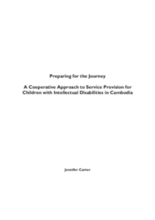To date, no formal research has been conducted on the issue of children with intellectual disabilities in Cambodia. The purpose of this study was to gain a better understanding of the challenges and needs of children with intellectual disabilities, their families, and service providers. In order to gather information from a breadth of resources, the following groups were interviewed: children with disabilities, parents, NGO staff, relevant government officers, and key informants. The information was collected through focus groups, semistructured interviews, and child participatory activities. As such, this was above all a qualitative study that yielded rich, in-depth data.
The overwhelming majority of participants voiced the strong and immediate need for improved education—both for service providers and children with disabilities. In particular, applicable life skills education and vocational training were identified as key issues. On a larger scale, country-wide health education must be improved to decrease the incidence of easily preventable disabilities, particularly cerebral palsy. A recurring theme amongst parents was the economic burden of raising a child with an intellectual disability and the need for at-home income-generating activities or day care facilities.
It was also found that children with intellectual disabilities and their families face significant discrimination in the community, ranging from childish to extremely violent. Many key informants and NGO staff also identified intra-family discrimination as a barrier to children with intellectual disabilities receiving the services they require.
This report concludes with a detailed set of recommended actions to take in order to address the issue of children with disabilities in Cambodia. Specifically, concrete steps must be taken in the following areas: Education, Health Care, Poverty Alleviation, and Promoting Inclusion in Society. The objectives and necessary actions proposed within the following framework cannot be addressed by a single organization. Rather, cooperation within and between governmental, non-governmental, and private sectors is vital to ensuring that children with intellectual disabilities receive services in a sustainable and cost-effective manner. Overall, a more collaborative approach must be adopted by current and future service providers. Disability should be viewed as a part of the overall development agenda of Cambodia, and an issue that affects all areas of society.

